Roman Empire's Decline and Fall
VerifiedAdded on 2020/04/15
|12
|3559
|380
AI Summary
This assignment delves into the multifaceted causes behind the decline and fall of the Roman Empire. It encourages students to analyze primary and secondary sources to understand the complex interplay of political, economic, social, and military factors that led to this historical turning point. The focus is on examining how these internal and external pressures contributed to the empire's eventual fragmentation.
Contribute Materials
Your contribution can guide someone’s learning journey. Share your
documents today.
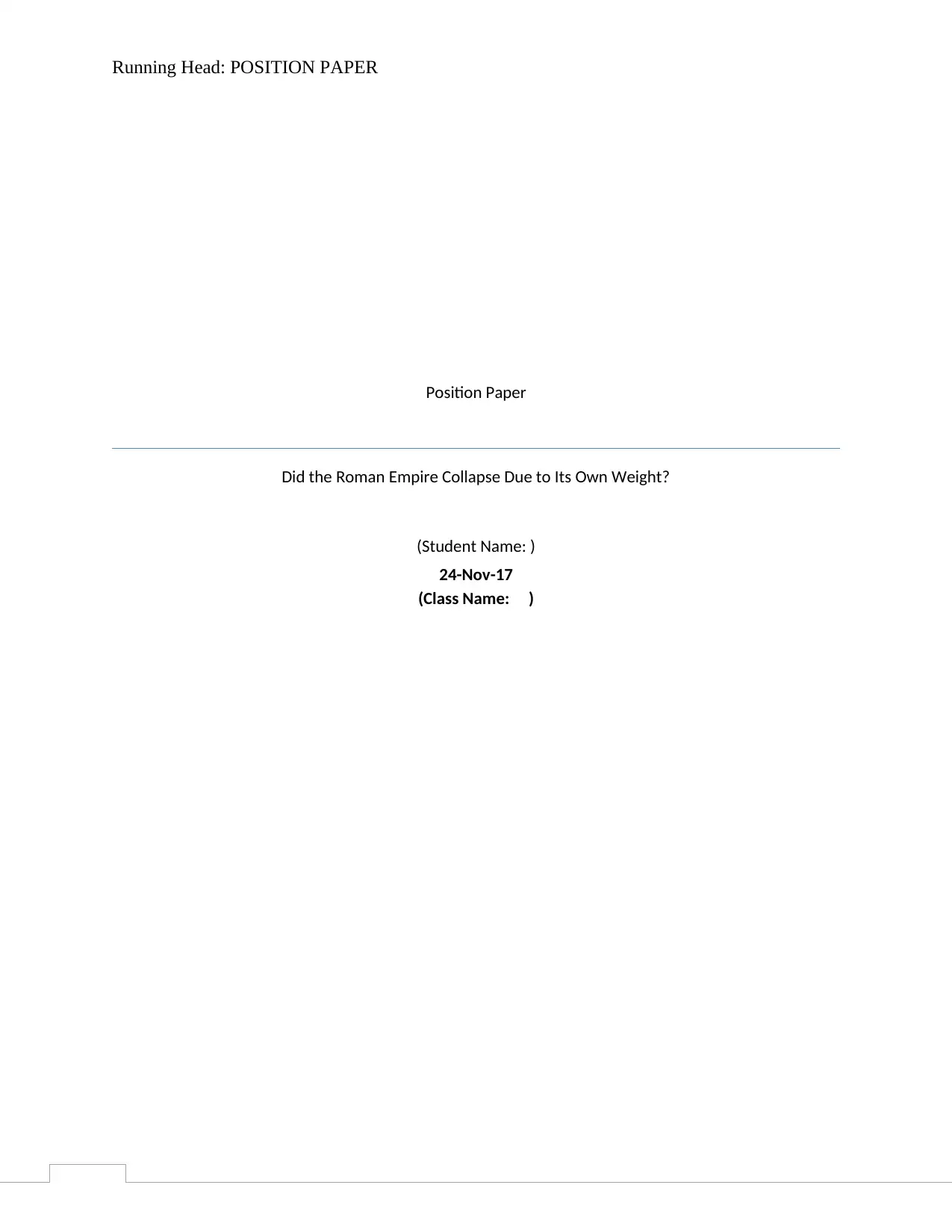
Running Head: POSITION PAPER
Position Paper
Did the Roman Empire Collapse Due to Its Own Weight?
(Student Name: )
24-Nov-17
(Class Name: )
Position Paper
Did the Roman Empire Collapse Due to Its Own Weight?
(Student Name: )
24-Nov-17
(Class Name: )
Secure Best Marks with AI Grader
Need help grading? Try our AI Grader for instant feedback on your assignments.
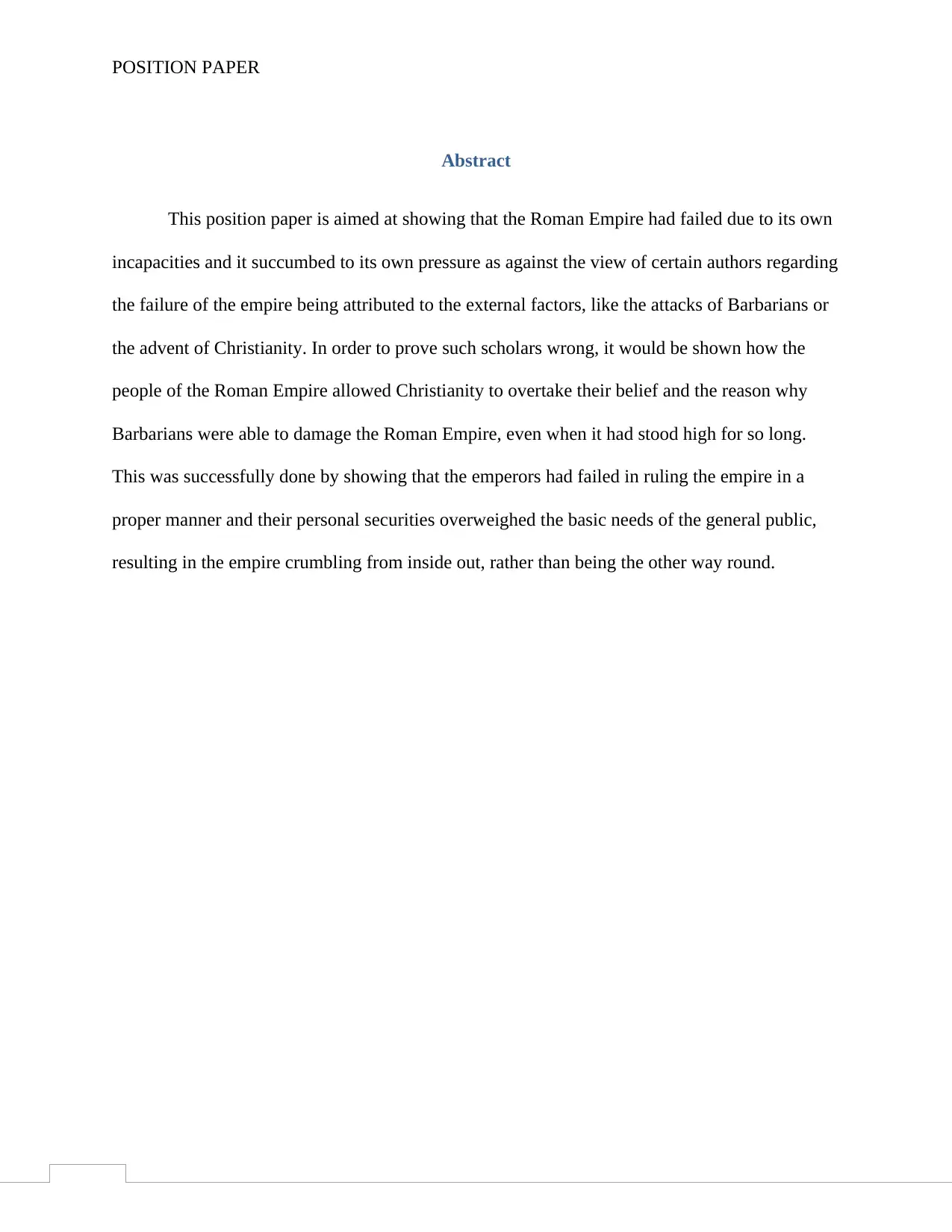
POSITION PAPER
Abstract
This position paper is aimed at showing that the Roman Empire had failed due to its own
incapacities and it succumbed to its own pressure as against the view of certain authors regarding
the failure of the empire being attributed to the external factors, like the attacks of Barbarians or
the advent of Christianity. In order to prove such scholars wrong, it would be shown how the
people of the Roman Empire allowed Christianity to overtake their belief and the reason why
Barbarians were able to damage the Roman Empire, even when it had stood high for so long.
This was successfully done by showing that the emperors had failed in ruling the empire in a
proper manner and their personal securities overweighed the basic needs of the general public,
resulting in the empire crumbling from inside out, rather than being the other way round.
Abstract
This position paper is aimed at showing that the Roman Empire had failed due to its own
incapacities and it succumbed to its own pressure as against the view of certain authors regarding
the failure of the empire being attributed to the external factors, like the attacks of Barbarians or
the advent of Christianity. In order to prove such scholars wrong, it would be shown how the
people of the Roman Empire allowed Christianity to overtake their belief and the reason why
Barbarians were able to damage the Roman Empire, even when it had stood high for so long.
This was successfully done by showing that the emperors had failed in ruling the empire in a
proper manner and their personal securities overweighed the basic needs of the general public,
resulting in the empire crumbling from inside out, rather than being the other way round.
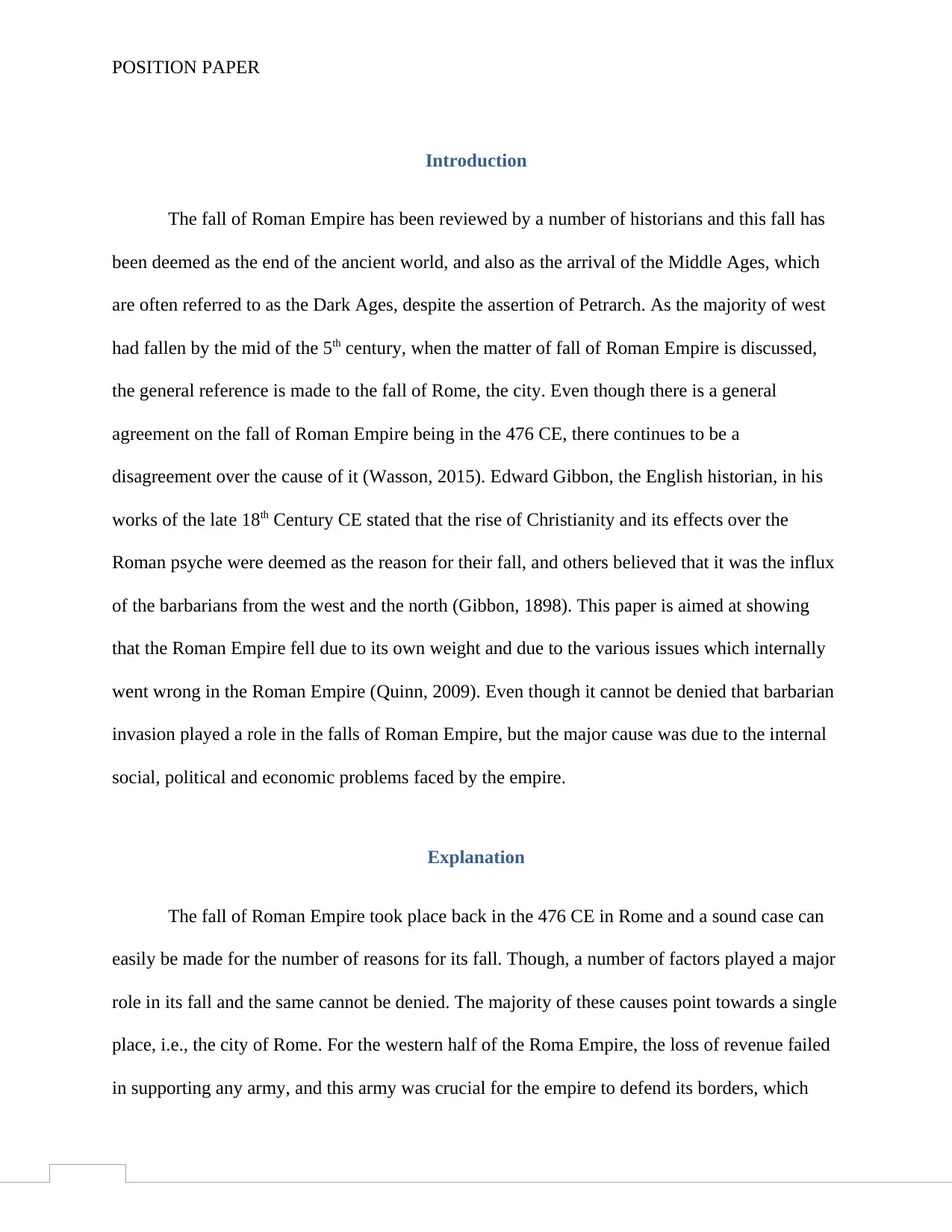
POSITION PAPER
Introduction
The fall of Roman Empire has been reviewed by a number of historians and this fall has
been deemed as the end of the ancient world, and also as the arrival of the Middle Ages, which
are often referred to as the Dark Ages, despite the assertion of Petrarch. As the majority of west
had fallen by the mid of the 5th century, when the matter of fall of Roman Empire is discussed,
the general reference is made to the fall of Rome, the city. Even though there is a general
agreement on the fall of Roman Empire being in the 476 CE, there continues to be a
disagreement over the cause of it (Wasson, 2015). Edward Gibbon, the English historian, in his
works of the late 18th Century CE stated that the rise of Christianity and its effects over the
Roman psyche were deemed as the reason for their fall, and others believed that it was the influx
of the barbarians from the west and the north (Gibbon, 1898). This paper is aimed at showing
that the Roman Empire fell due to its own weight and due to the various issues which internally
went wrong in the Roman Empire (Quinn, 2009). Even though it cannot be denied that barbarian
invasion played a role in the falls of Roman Empire, but the major cause was due to the internal
social, political and economic problems faced by the empire.
Explanation
The fall of Roman Empire took place back in the 476 CE in Rome and a sound case can
easily be made for the number of reasons for its fall. Though, a number of factors played a major
role in its fall and the same cannot be denied. The majority of these causes point towards a single
place, i.e., the city of Rome. For the western half of the Roma Empire, the loss of revenue failed
in supporting any army, and this army was crucial for the empire to defend its borders, which
Introduction
The fall of Roman Empire has been reviewed by a number of historians and this fall has
been deemed as the end of the ancient world, and also as the arrival of the Middle Ages, which
are often referred to as the Dark Ages, despite the assertion of Petrarch. As the majority of west
had fallen by the mid of the 5th century, when the matter of fall of Roman Empire is discussed,
the general reference is made to the fall of Rome, the city. Even though there is a general
agreement on the fall of Roman Empire being in the 476 CE, there continues to be a
disagreement over the cause of it (Wasson, 2015). Edward Gibbon, the English historian, in his
works of the late 18th Century CE stated that the rise of Christianity and its effects over the
Roman psyche were deemed as the reason for their fall, and others believed that it was the influx
of the barbarians from the west and the north (Gibbon, 1898). This paper is aimed at showing
that the Roman Empire fell due to its own weight and due to the various issues which internally
went wrong in the Roman Empire (Quinn, 2009). Even though it cannot be denied that barbarian
invasion played a role in the falls of Roman Empire, but the major cause was due to the internal
social, political and economic problems faced by the empire.
Explanation
The fall of Roman Empire took place back in the 476 CE in Rome and a sound case can
easily be made for the number of reasons for its fall. Though, a number of factors played a major
role in its fall and the same cannot be denied. The majority of these causes point towards a single
place, i.e., the city of Rome. For the western half of the Roma Empire, the loss of revenue failed
in supporting any army, and this army was crucial for the empire to defend its borders, which
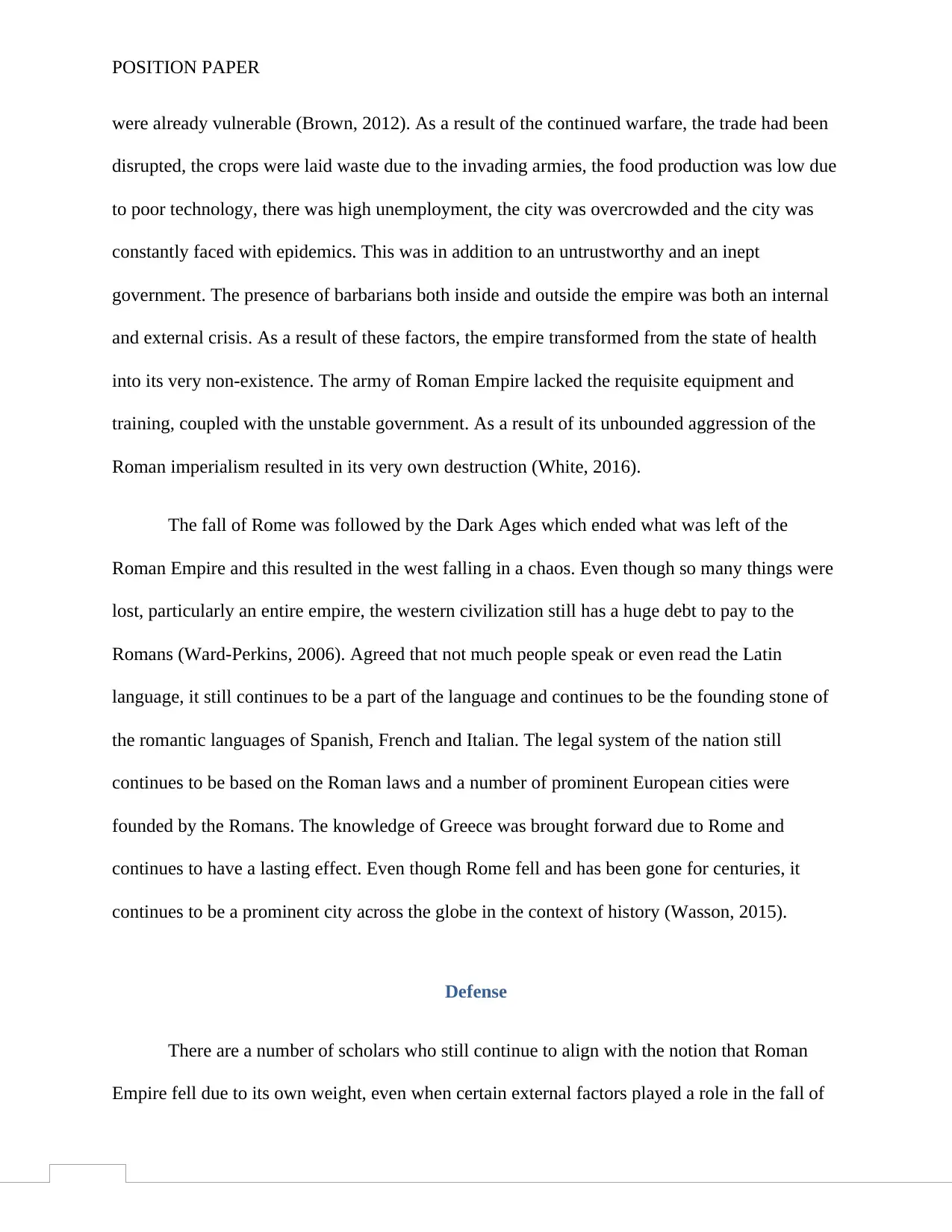
POSITION PAPER
were already vulnerable (Brown, 2012). As a result of the continued warfare, the trade had been
disrupted, the crops were laid waste due to the invading armies, the food production was low due
to poor technology, there was high unemployment, the city was overcrowded and the city was
constantly faced with epidemics. This was in addition to an untrustworthy and an inept
government. The presence of barbarians both inside and outside the empire was both an internal
and external crisis. As a result of these factors, the empire transformed from the state of health
into its very non-existence. The army of Roman Empire lacked the requisite equipment and
training, coupled with the unstable government. As a result of its unbounded aggression of the
Roman imperialism resulted in its very own destruction (White, 2016).
The fall of Rome was followed by the Dark Ages which ended what was left of the
Roman Empire and this resulted in the west falling in a chaos. Even though so many things were
lost, particularly an entire empire, the western civilization still has a huge debt to pay to the
Romans (Ward-Perkins, 2006). Agreed that not much people speak or even read the Latin
language, it still continues to be a part of the language and continues to be the founding stone of
the romantic languages of Spanish, French and Italian. The legal system of the nation still
continues to be based on the Roman laws and a number of prominent European cities were
founded by the Romans. The knowledge of Greece was brought forward due to Rome and
continues to have a lasting effect. Even though Rome fell and has been gone for centuries, it
continues to be a prominent city across the globe in the context of history (Wasson, 2015).
Defense
There are a number of scholars who still continue to align with the notion that Roman
Empire fell due to its own weight, even when certain external factors played a role in the fall of
were already vulnerable (Brown, 2012). As a result of the continued warfare, the trade had been
disrupted, the crops were laid waste due to the invading armies, the food production was low due
to poor technology, there was high unemployment, the city was overcrowded and the city was
constantly faced with epidemics. This was in addition to an untrustworthy and an inept
government. The presence of barbarians both inside and outside the empire was both an internal
and external crisis. As a result of these factors, the empire transformed from the state of health
into its very non-existence. The army of Roman Empire lacked the requisite equipment and
training, coupled with the unstable government. As a result of its unbounded aggression of the
Roman imperialism resulted in its very own destruction (White, 2016).
The fall of Rome was followed by the Dark Ages which ended what was left of the
Roman Empire and this resulted in the west falling in a chaos. Even though so many things were
lost, particularly an entire empire, the western civilization still has a huge debt to pay to the
Romans (Ward-Perkins, 2006). Agreed that not much people speak or even read the Latin
language, it still continues to be a part of the language and continues to be the founding stone of
the romantic languages of Spanish, French and Italian. The legal system of the nation still
continues to be based on the Roman laws and a number of prominent European cities were
founded by the Romans. The knowledge of Greece was brought forward due to Rome and
continues to have a lasting effect. Even though Rome fell and has been gone for centuries, it
continues to be a prominent city across the globe in the context of history (Wasson, 2015).
Defense
There are a number of scholars who still continue to align with the notion that Roman
Empire fell due to its own weight, even when certain external factors played a role in the fall of
Secure Best Marks with AI Grader
Need help grading? Try our AI Grader for instant feedback on your assignments.
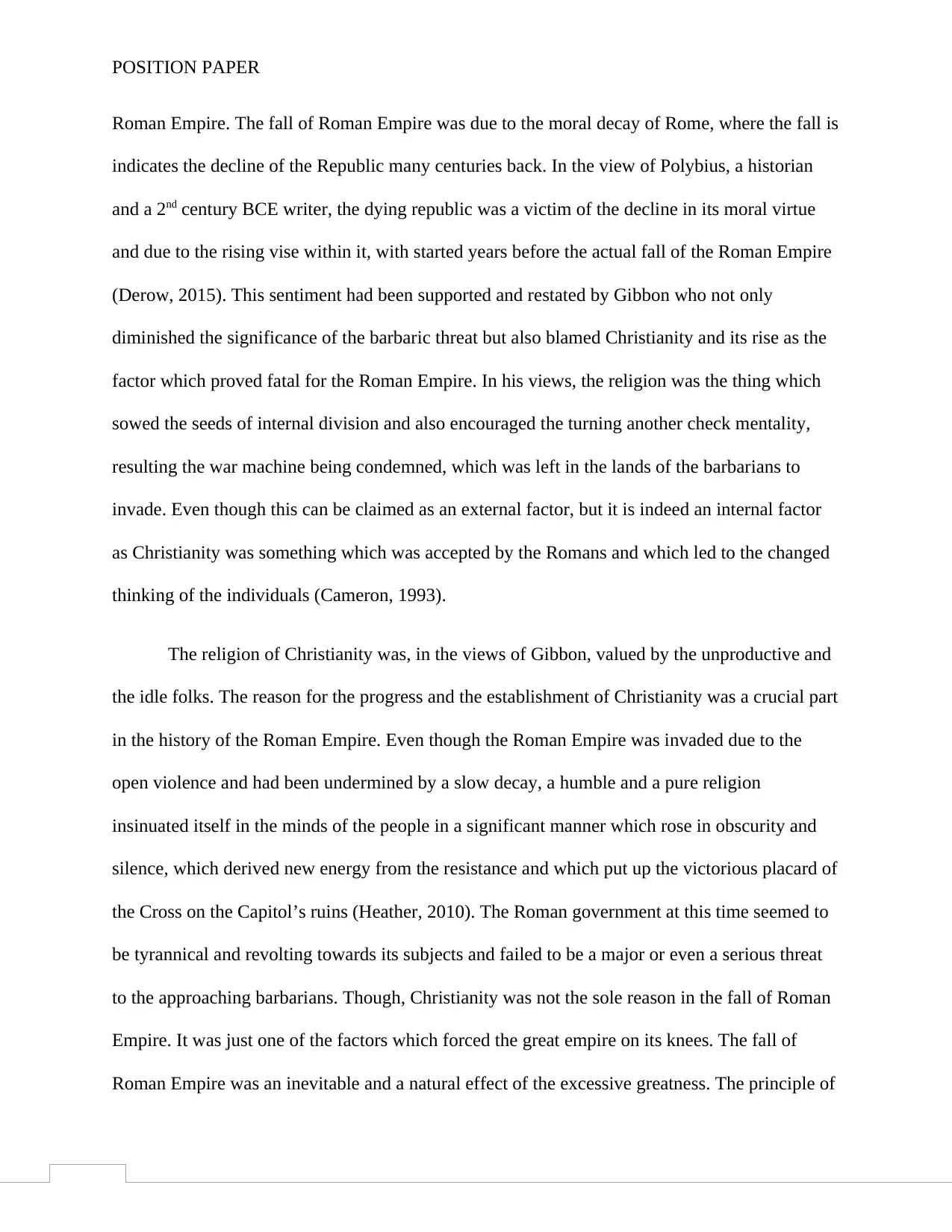
POSITION PAPER
Roman Empire. The fall of Roman Empire was due to the moral decay of Rome, where the fall is
indicates the decline of the Republic many centuries back. In the view of Polybius, a historian
and a 2nd century BCE writer, the dying republic was a victim of the decline in its moral virtue
and due to the rising vise within it, with started years before the actual fall of the Roman Empire
(Derow, 2015). This sentiment had been supported and restated by Gibbon who not only
diminished the significance of the barbaric threat but also blamed Christianity and its rise as the
factor which proved fatal for the Roman Empire. In his views, the religion was the thing which
sowed the seeds of internal division and also encouraged the turning another check mentality,
resulting the war machine being condemned, which was left in the lands of the barbarians to
invade. Even though this can be claimed as an external factor, but it is indeed an internal factor
as Christianity was something which was accepted by the Romans and which led to the changed
thinking of the individuals (Cameron, 1993).
The religion of Christianity was, in the views of Gibbon, valued by the unproductive and
the idle folks. The reason for the progress and the establishment of Christianity was a crucial part
in the history of the Roman Empire. Even though the Roman Empire was invaded due to the
open violence and had been undermined by a slow decay, a humble and a pure religion
insinuated itself in the minds of the people in a significant manner which rose in obscurity and
silence, which derived new energy from the resistance and which put up the victorious placard of
the Cross on the Capitol’s ruins (Heather, 2010). The Roman government at this time seemed to
be tyrannical and revolting towards its subjects and failed to be a major or even a serious threat
to the approaching barbarians. Though, Christianity was not the sole reason in the fall of Roman
Empire. It was just one of the factors which forced the great empire on its knees. The fall of
Roman Empire was an inevitable and a natural effect of the excessive greatness. The principle of
Roman Empire. The fall of Roman Empire was due to the moral decay of Rome, where the fall is
indicates the decline of the Republic many centuries back. In the view of Polybius, a historian
and a 2nd century BCE writer, the dying republic was a victim of the decline in its moral virtue
and due to the rising vise within it, with started years before the actual fall of the Roman Empire
(Derow, 2015). This sentiment had been supported and restated by Gibbon who not only
diminished the significance of the barbaric threat but also blamed Christianity and its rise as the
factor which proved fatal for the Roman Empire. In his views, the religion was the thing which
sowed the seeds of internal division and also encouraged the turning another check mentality,
resulting the war machine being condemned, which was left in the lands of the barbarians to
invade. Even though this can be claimed as an external factor, but it is indeed an internal factor
as Christianity was something which was accepted by the Romans and which led to the changed
thinking of the individuals (Cameron, 1993).
The religion of Christianity was, in the views of Gibbon, valued by the unproductive and
the idle folks. The reason for the progress and the establishment of Christianity was a crucial part
in the history of the Roman Empire. Even though the Roman Empire was invaded due to the
open violence and had been undermined by a slow decay, a humble and a pure religion
insinuated itself in the minds of the people in a significant manner which rose in obscurity and
silence, which derived new energy from the resistance and which put up the victorious placard of
the Cross on the Capitol’s ruins (Heather, 2010). The Roman government at this time seemed to
be tyrannical and revolting towards its subjects and failed to be a major or even a serious threat
to the approaching barbarians. Though, Christianity was not the sole reason in the fall of Roman
Empire. It was just one of the factors which forced the great empire on its knees. The fall of
Roman Empire was an inevitable and a natural effect of the excessive greatness. The principle of
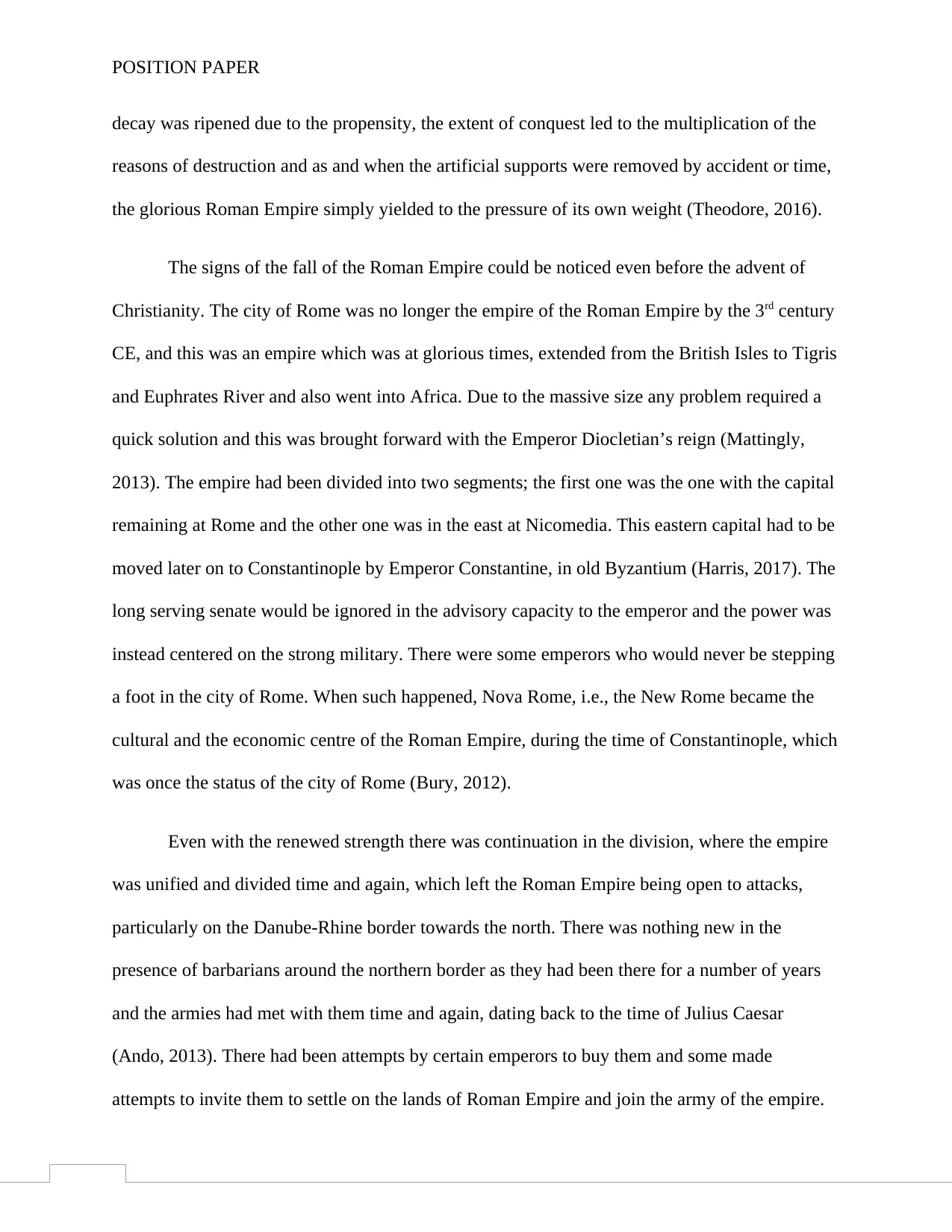
POSITION PAPER
decay was ripened due to the propensity, the extent of conquest led to the multiplication of the
reasons of destruction and as and when the artificial supports were removed by accident or time,
the glorious Roman Empire simply yielded to the pressure of its own weight (Theodore, 2016).
The signs of the fall of the Roman Empire could be noticed even before the advent of
Christianity. The city of Rome was no longer the empire of the Roman Empire by the 3rd century
CE, and this was an empire which was at glorious times, extended from the British Isles to Tigris
and Euphrates River and also went into Africa. Due to the massive size any problem required a
quick solution and this was brought forward with the Emperor Diocletian’s reign (Mattingly,
2013). The empire had been divided into two segments; the first one was the one with the capital
remaining at Rome and the other one was in the east at Nicomedia. This eastern capital had to be
moved later on to Constantinople by Emperor Constantine, in old Byzantium (Harris, 2017). The
long serving senate would be ignored in the advisory capacity to the emperor and the power was
instead centered on the strong military. There were some emperors who would never be stepping
a foot in the city of Rome. When such happened, Nova Rome, i.e., the New Rome became the
cultural and the economic centre of the Roman Empire, during the time of Constantinople, which
was once the status of the city of Rome (Bury, 2012).
Even with the renewed strength there was continuation in the division, where the empire
was unified and divided time and again, which left the Roman Empire being open to attacks,
particularly on the Danube-Rhine border towards the north. There was nothing new in the
presence of barbarians around the northern border as they had been there for a number of years
and the armies had met with them time and again, dating back to the time of Julius Caesar
(Ando, 2013). There had been attempts by certain emperors to buy them and some made
attempts to invite them to settle on the lands of Roman Empire and join the army of the empire.
decay was ripened due to the propensity, the extent of conquest led to the multiplication of the
reasons of destruction and as and when the artificial supports were removed by accident or time,
the glorious Roman Empire simply yielded to the pressure of its own weight (Theodore, 2016).
The signs of the fall of the Roman Empire could be noticed even before the advent of
Christianity. The city of Rome was no longer the empire of the Roman Empire by the 3rd century
CE, and this was an empire which was at glorious times, extended from the British Isles to Tigris
and Euphrates River and also went into Africa. Due to the massive size any problem required a
quick solution and this was brought forward with the Emperor Diocletian’s reign (Mattingly,
2013). The empire had been divided into two segments; the first one was the one with the capital
remaining at Rome and the other one was in the east at Nicomedia. This eastern capital had to be
moved later on to Constantinople by Emperor Constantine, in old Byzantium (Harris, 2017). The
long serving senate would be ignored in the advisory capacity to the emperor and the power was
instead centered on the strong military. There were some emperors who would never be stepping
a foot in the city of Rome. When such happened, Nova Rome, i.e., the New Rome became the
cultural and the economic centre of the Roman Empire, during the time of Constantinople, which
was once the status of the city of Rome (Bury, 2012).
Even with the renewed strength there was continuation in the division, where the empire
was unified and divided time and again, which left the Roman Empire being open to attacks,
particularly on the Danube-Rhine border towards the north. There was nothing new in the
presence of barbarians around the northern border as they had been there for a number of years
and the armies had met with them time and again, dating back to the time of Julius Caesar
(Ando, 2013). There had been attempts by certain emperors to buy them and some made
attempts to invite them to settle on the lands of Roman Empire and join the army of the empire.
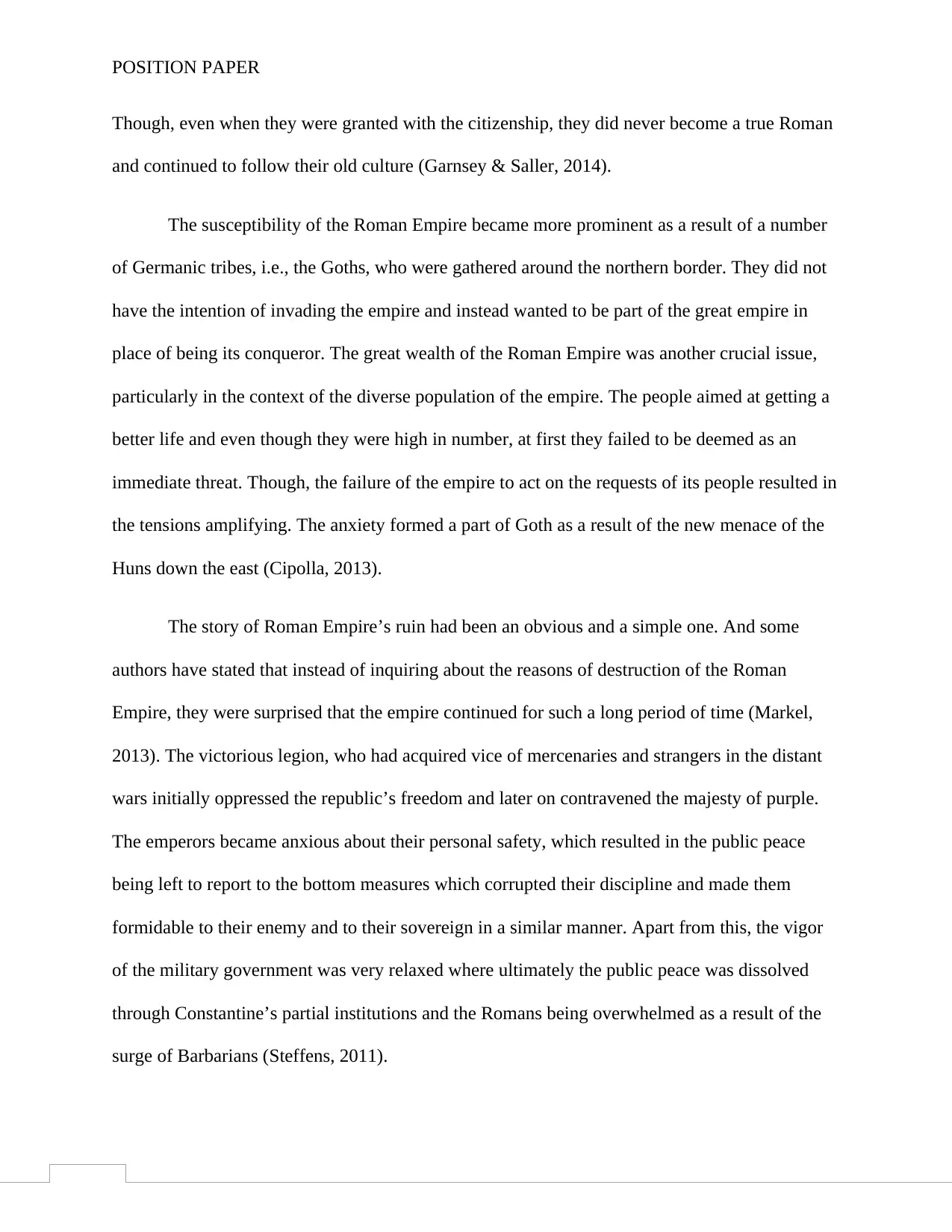
POSITION PAPER
Though, even when they were granted with the citizenship, they did never become a true Roman
and continued to follow their old culture (Garnsey & Saller, 2014).
The susceptibility of the Roman Empire became more prominent as a result of a number
of Germanic tribes, i.e., the Goths, who were gathered around the northern border. They did not
have the intention of invading the empire and instead wanted to be part of the great empire in
place of being its conqueror. The great wealth of the Roman Empire was another crucial issue,
particularly in the context of the diverse population of the empire. The people aimed at getting a
better life and even though they were high in number, at first they failed to be deemed as an
immediate threat. Though, the failure of the empire to act on the requests of its people resulted in
the tensions amplifying. The anxiety formed a part of Goth as a result of the new menace of the
Huns down the east (Cipolla, 2013).
The story of Roman Empire’s ruin had been an obvious and a simple one. And some
authors have stated that instead of inquiring about the reasons of destruction of the Roman
Empire, they were surprised that the empire continued for such a long period of time (Markel,
2013). The victorious legion, who had acquired vice of mercenaries and strangers in the distant
wars initially oppressed the republic’s freedom and later on contravened the majesty of purple.
The emperors became anxious about their personal safety, which resulted in the public peace
being left to report to the bottom measures which corrupted their discipline and made them
formidable to their enemy and to their sovereign in a similar manner. Apart from this, the vigor
of the military government was very relaxed where ultimately the public peace was dissolved
through Constantine’s partial institutions and the Romans being overwhelmed as a result of the
surge of Barbarians (Steffens, 2011).
Though, even when they were granted with the citizenship, they did never become a true Roman
and continued to follow their old culture (Garnsey & Saller, 2014).
The susceptibility of the Roman Empire became more prominent as a result of a number
of Germanic tribes, i.e., the Goths, who were gathered around the northern border. They did not
have the intention of invading the empire and instead wanted to be part of the great empire in
place of being its conqueror. The great wealth of the Roman Empire was another crucial issue,
particularly in the context of the diverse population of the empire. The people aimed at getting a
better life and even though they were high in number, at first they failed to be deemed as an
immediate threat. Though, the failure of the empire to act on the requests of its people resulted in
the tensions amplifying. The anxiety formed a part of Goth as a result of the new menace of the
Huns down the east (Cipolla, 2013).
The story of Roman Empire’s ruin had been an obvious and a simple one. And some
authors have stated that instead of inquiring about the reasons of destruction of the Roman
Empire, they were surprised that the empire continued for such a long period of time (Markel,
2013). The victorious legion, who had acquired vice of mercenaries and strangers in the distant
wars initially oppressed the republic’s freedom and later on contravened the majesty of purple.
The emperors became anxious about their personal safety, which resulted in the public peace
being left to report to the bottom measures which corrupted their discipline and made them
formidable to their enemy and to their sovereign in a similar manner. Apart from this, the vigor
of the military government was very relaxed where ultimately the public peace was dissolved
through Constantine’s partial institutions and the Romans being overwhelmed as a result of the
surge of Barbarians (Steffens, 2011).
Paraphrase This Document
Need a fresh take? Get an instant paraphrase of this document with our AI Paraphraser
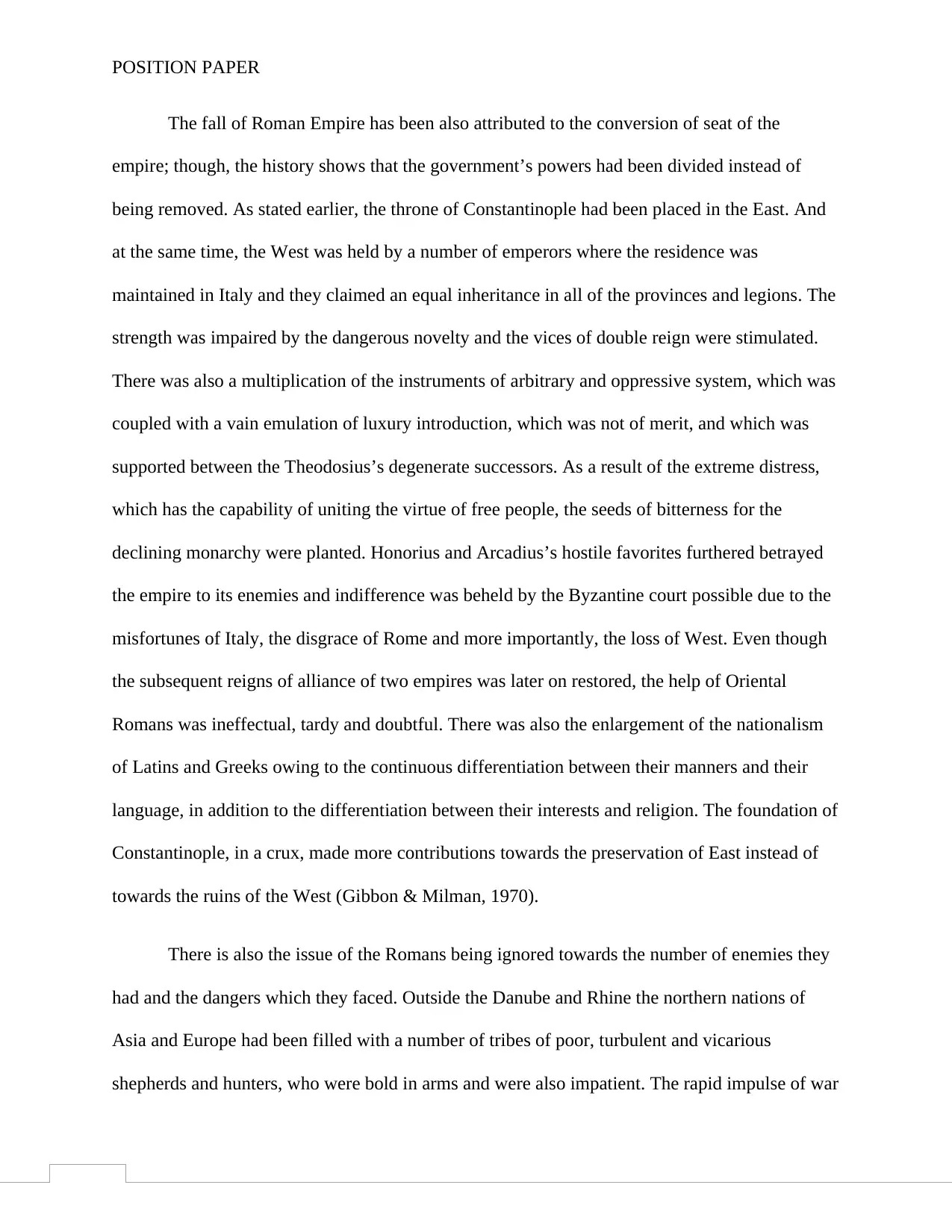
POSITION PAPER
The fall of Roman Empire has been also attributed to the conversion of seat of the
empire; though, the history shows that the government’s powers had been divided instead of
being removed. As stated earlier, the throne of Constantinople had been placed in the East. And
at the same time, the West was held by a number of emperors where the residence was
maintained in Italy and they claimed an equal inheritance in all of the provinces and legions. The
strength was impaired by the dangerous novelty and the vices of double reign were stimulated.
There was also a multiplication of the instruments of arbitrary and oppressive system, which was
coupled with a vain emulation of luxury introduction, which was not of merit, and which was
supported between the Theodosius’s degenerate successors. As a result of the extreme distress,
which has the capability of uniting the virtue of free people, the seeds of bitterness for the
declining monarchy were planted. Honorius and Arcadius’s hostile favorites furthered betrayed
the empire to its enemies and indifference was beheld by the Byzantine court possible due to the
misfortunes of Italy, the disgrace of Rome and more importantly, the loss of West. Even though
the subsequent reigns of alliance of two empires was later on restored, the help of Oriental
Romans was ineffectual, tardy and doubtful. There was also the enlargement of the nationalism
of Latins and Greeks owing to the continuous differentiation between their manners and their
language, in addition to the differentiation between their interests and religion. The foundation of
Constantinople, in a crux, made more contributions towards the preservation of East instead of
towards the ruins of the West (Gibbon & Milman, 1970).
There is also the issue of the Romans being ignored towards the number of enemies they
had and the dangers which they faced. Outside the Danube and Rhine the northern nations of
Asia and Europe had been filled with a number of tribes of poor, turbulent and vicarious
shepherds and hunters, who were bold in arms and were also impatient. The rapid impulse of war
The fall of Roman Empire has been also attributed to the conversion of seat of the
empire; though, the history shows that the government’s powers had been divided instead of
being removed. As stated earlier, the throne of Constantinople had been placed in the East. And
at the same time, the West was held by a number of emperors where the residence was
maintained in Italy and they claimed an equal inheritance in all of the provinces and legions. The
strength was impaired by the dangerous novelty and the vices of double reign were stimulated.
There was also a multiplication of the instruments of arbitrary and oppressive system, which was
coupled with a vain emulation of luxury introduction, which was not of merit, and which was
supported between the Theodosius’s degenerate successors. As a result of the extreme distress,
which has the capability of uniting the virtue of free people, the seeds of bitterness for the
declining monarchy were planted. Honorius and Arcadius’s hostile favorites furthered betrayed
the empire to its enemies and indifference was beheld by the Byzantine court possible due to the
misfortunes of Italy, the disgrace of Rome and more importantly, the loss of West. Even though
the subsequent reigns of alliance of two empires was later on restored, the help of Oriental
Romans was ineffectual, tardy and doubtful. There was also the enlargement of the nationalism
of Latins and Greeks owing to the continuous differentiation between their manners and their
language, in addition to the differentiation between their interests and religion. The foundation of
Constantinople, in a crux, made more contributions towards the preservation of East instead of
towards the ruins of the West (Gibbon & Milman, 1970).
There is also the issue of the Romans being ignored towards the number of enemies they
had and the dangers which they faced. Outside the Danube and Rhine the northern nations of
Asia and Europe had been filled with a number of tribes of poor, turbulent and vicarious
shepherds and hunters, who were bold in arms and were also impatient. The rapid impulse of war
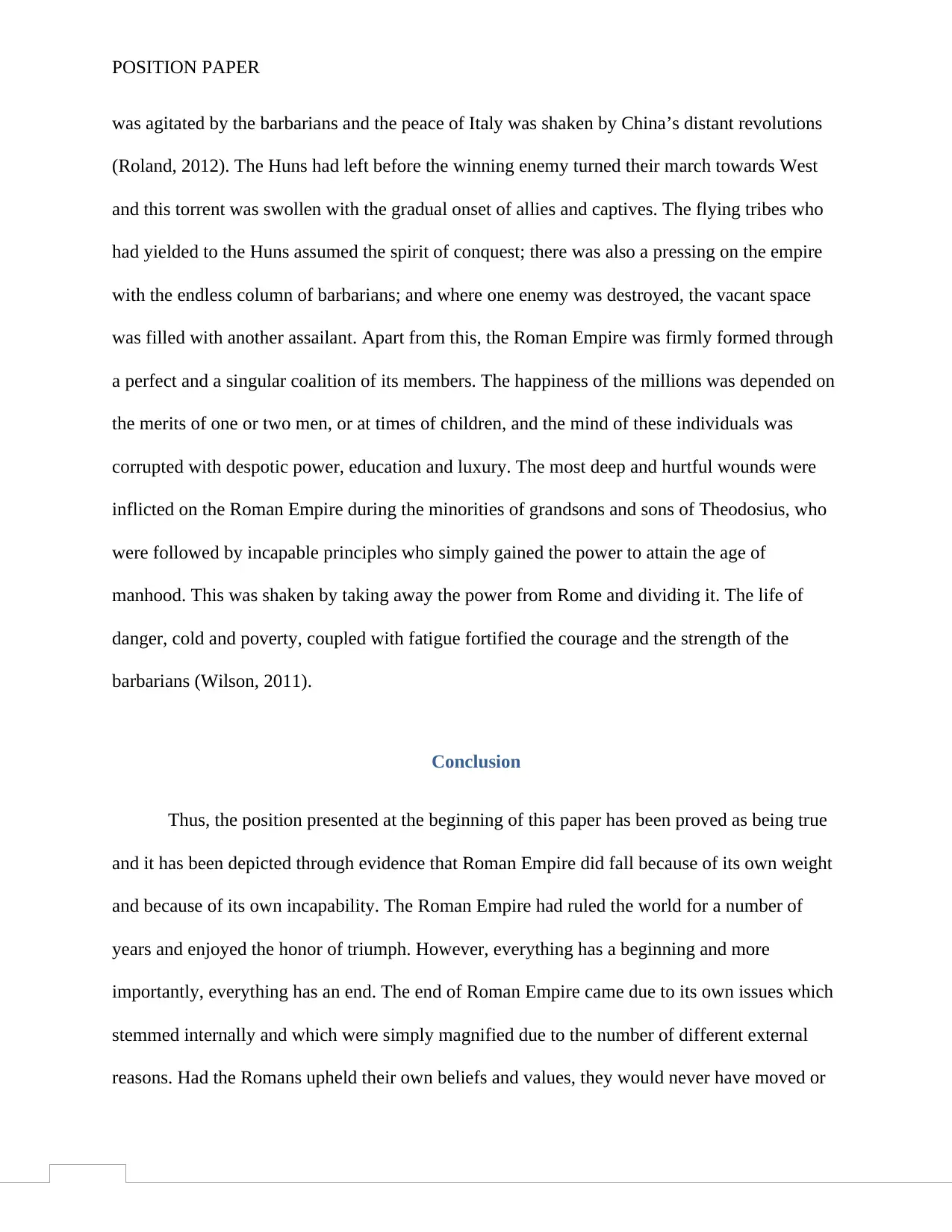
POSITION PAPER
was agitated by the barbarians and the peace of Italy was shaken by China’s distant revolutions
(Roland, 2012). The Huns had left before the winning enemy turned their march towards West
and this torrent was swollen with the gradual onset of allies and captives. The flying tribes who
had yielded to the Huns assumed the spirit of conquest; there was also a pressing on the empire
with the endless column of barbarians; and where one enemy was destroyed, the vacant space
was filled with another assailant. Apart from this, the Roman Empire was firmly formed through
a perfect and a singular coalition of its members. The happiness of the millions was depended on
the merits of one or two men, or at times of children, and the mind of these individuals was
corrupted with despotic power, education and luxury. The most deep and hurtful wounds were
inflicted on the Roman Empire during the minorities of grandsons and sons of Theodosius, who
were followed by incapable principles who simply gained the power to attain the age of
manhood. This was shaken by taking away the power from Rome and dividing it. The life of
danger, cold and poverty, coupled with fatigue fortified the courage and the strength of the
barbarians (Wilson, 2011).
Conclusion
Thus, the position presented at the beginning of this paper has been proved as being true
and it has been depicted through evidence that Roman Empire did fall because of its own weight
and because of its own incapability. The Roman Empire had ruled the world for a number of
years and enjoyed the honor of triumph. However, everything has a beginning and more
importantly, everything has an end. The end of Roman Empire came due to its own issues which
stemmed internally and which were simply magnified due to the number of different external
reasons. Had the Romans upheld their own beliefs and values, they would never have moved or
was agitated by the barbarians and the peace of Italy was shaken by China’s distant revolutions
(Roland, 2012). The Huns had left before the winning enemy turned their march towards West
and this torrent was swollen with the gradual onset of allies and captives. The flying tribes who
had yielded to the Huns assumed the spirit of conquest; there was also a pressing on the empire
with the endless column of barbarians; and where one enemy was destroyed, the vacant space
was filled with another assailant. Apart from this, the Roman Empire was firmly formed through
a perfect and a singular coalition of its members. The happiness of the millions was depended on
the merits of one or two men, or at times of children, and the mind of these individuals was
corrupted with despotic power, education and luxury. The most deep and hurtful wounds were
inflicted on the Roman Empire during the minorities of grandsons and sons of Theodosius, who
were followed by incapable principles who simply gained the power to attain the age of
manhood. This was shaken by taking away the power from Rome and dividing it. The life of
danger, cold and poverty, coupled with fatigue fortified the courage and the strength of the
barbarians (Wilson, 2011).
Conclusion
Thus, the position presented at the beginning of this paper has been proved as being true
and it has been depicted through evidence that Roman Empire did fall because of its own weight
and because of its own incapability. The Roman Empire had ruled the world for a number of
years and enjoyed the honor of triumph. However, everything has a beginning and more
importantly, everything has an end. The end of Roman Empire came due to its own issues which
stemmed internally and which were simply magnified due to the number of different external
reasons. Had the Romans upheld their own beliefs and values, they would never have moved or
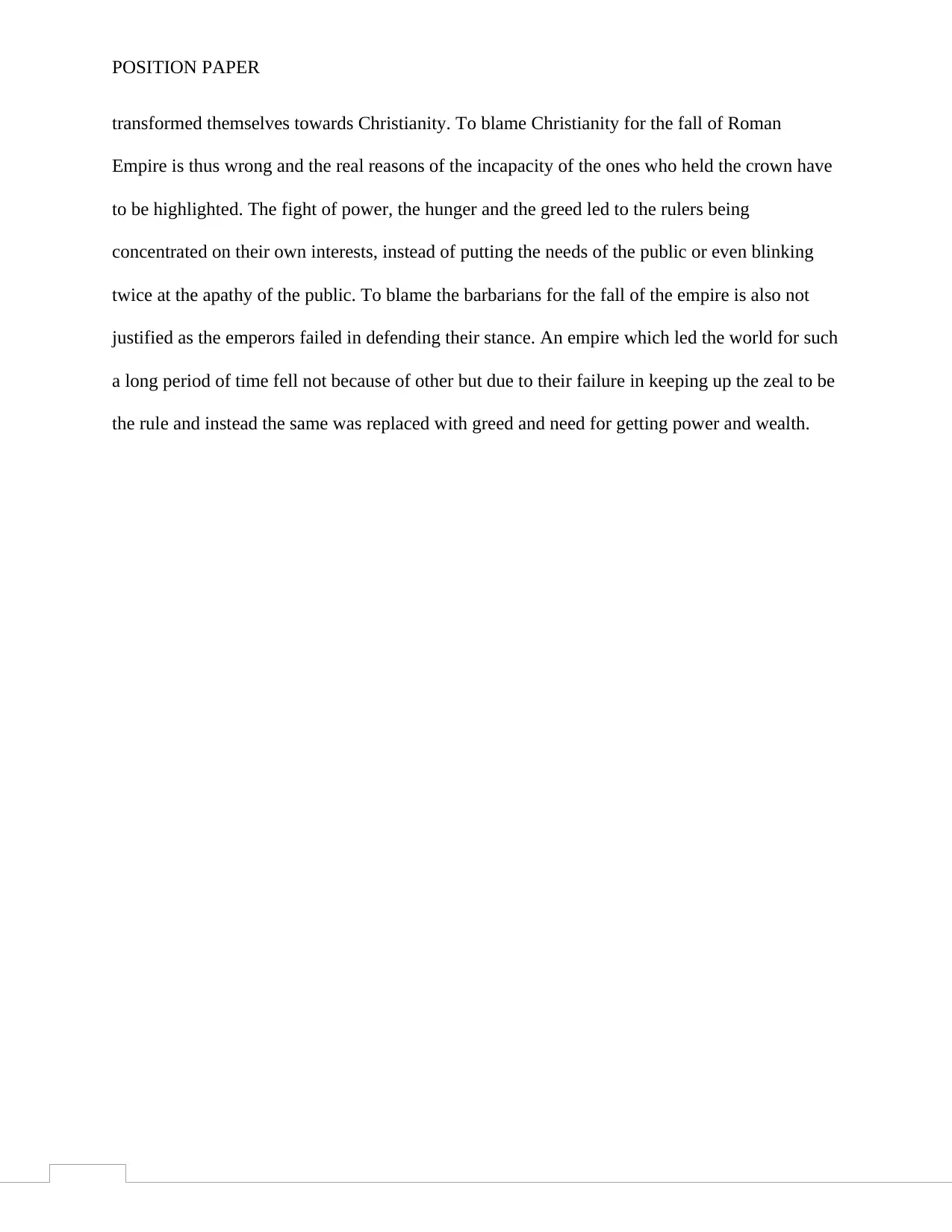
POSITION PAPER
transformed themselves towards Christianity. To blame Christianity for the fall of Roman
Empire is thus wrong and the real reasons of the incapacity of the ones who held the crown have
to be highlighted. The fight of power, the hunger and the greed led to the rulers being
concentrated on their own interests, instead of putting the needs of the public or even blinking
twice at the apathy of the public. To blame the barbarians for the fall of the empire is also not
justified as the emperors failed in defending their stance. An empire which led the world for such
a long period of time fell not because of other but due to their failure in keeping up the zeal to be
the rule and instead the same was replaced with greed and need for getting power and wealth.
transformed themselves towards Christianity. To blame Christianity for the fall of Roman
Empire is thus wrong and the real reasons of the incapacity of the ones who held the crown have
to be highlighted. The fight of power, the hunger and the greed led to the rulers being
concentrated on their own interests, instead of putting the needs of the public or even blinking
twice at the apathy of the public. To blame the barbarians for the fall of the empire is also not
justified as the emperors failed in defending their stance. An empire which led the world for such
a long period of time fell not because of other but due to their failure in keeping up the zeal to be
the rule and instead the same was replaced with greed and need for getting power and wealth.
Secure Best Marks with AI Grader
Need help grading? Try our AI Grader for instant feedback on your assignments.
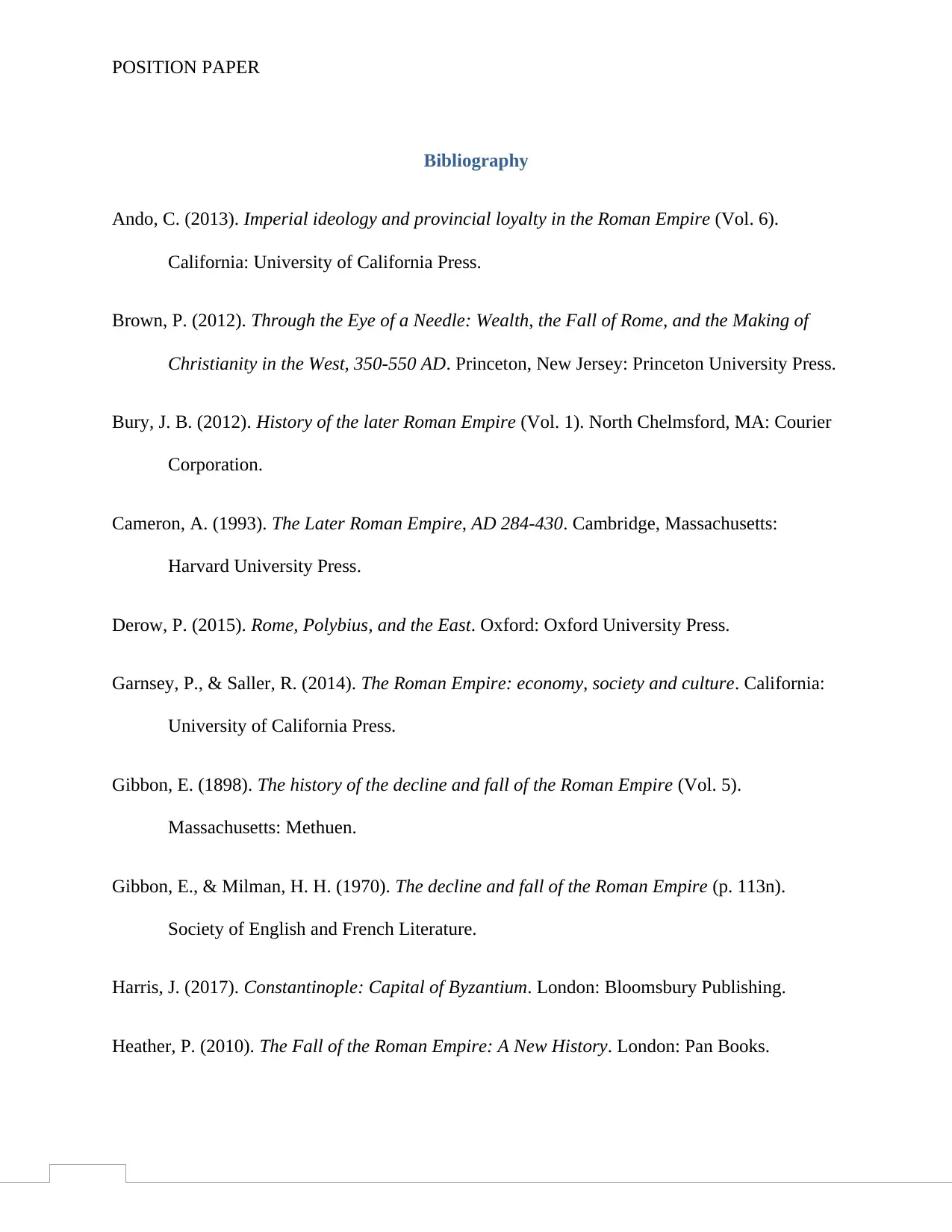
POSITION PAPER
Bibliography
Ando, C. (2013). Imperial ideology and provincial loyalty in the Roman Empire (Vol. 6).
California: University of California Press.
Brown, P. (2012). Through the Eye of a Needle: Wealth, the Fall of Rome, and the Making of
Christianity in the West, 350-550 AD. Princeton, New Jersey: Princeton University Press.
Bury, J. B. (2012). History of the later Roman Empire (Vol. 1). North Chelmsford, MA: Courier
Corporation.
Cameron, A. (1993). The Later Roman Empire, AD 284-430. Cambridge, Massachusetts:
Harvard University Press.
Derow, P. (2015). Rome, Polybius, and the East. Oxford: Oxford University Press.
Garnsey, P., & Saller, R. (2014). The Roman Empire: economy, society and culture. California:
University of California Press.
Gibbon, E. (1898). The history of the decline and fall of the Roman Empire (Vol. 5).
Massachusetts: Methuen.
Gibbon, E., & Milman, H. H. (1970). The decline and fall of the Roman Empire (p. 113n).
Society of English and French Literature.
Harris, J. (2017). Constantinople: Capital of Byzantium. London: Bloomsbury Publishing.
Heather, P. (2010). The Fall of the Roman Empire: A New History. London: Pan Books.
Bibliography
Ando, C. (2013). Imperial ideology and provincial loyalty in the Roman Empire (Vol. 6).
California: University of California Press.
Brown, P. (2012). Through the Eye of a Needle: Wealth, the Fall of Rome, and the Making of
Christianity in the West, 350-550 AD. Princeton, New Jersey: Princeton University Press.
Bury, J. B. (2012). History of the later Roman Empire (Vol. 1). North Chelmsford, MA: Courier
Corporation.
Cameron, A. (1993). The Later Roman Empire, AD 284-430. Cambridge, Massachusetts:
Harvard University Press.
Derow, P. (2015). Rome, Polybius, and the East. Oxford: Oxford University Press.
Garnsey, P., & Saller, R. (2014). The Roman Empire: economy, society and culture. California:
University of California Press.
Gibbon, E. (1898). The history of the decline and fall of the Roman Empire (Vol. 5).
Massachusetts: Methuen.
Gibbon, E., & Milman, H. H. (1970). The decline and fall of the Roman Empire (p. 113n).
Society of English and French Literature.
Harris, J. (2017). Constantinople: Capital of Byzantium. London: Bloomsbury Publishing.
Heather, P. (2010). The Fall of the Roman Empire: A New History. London: Pan Books.
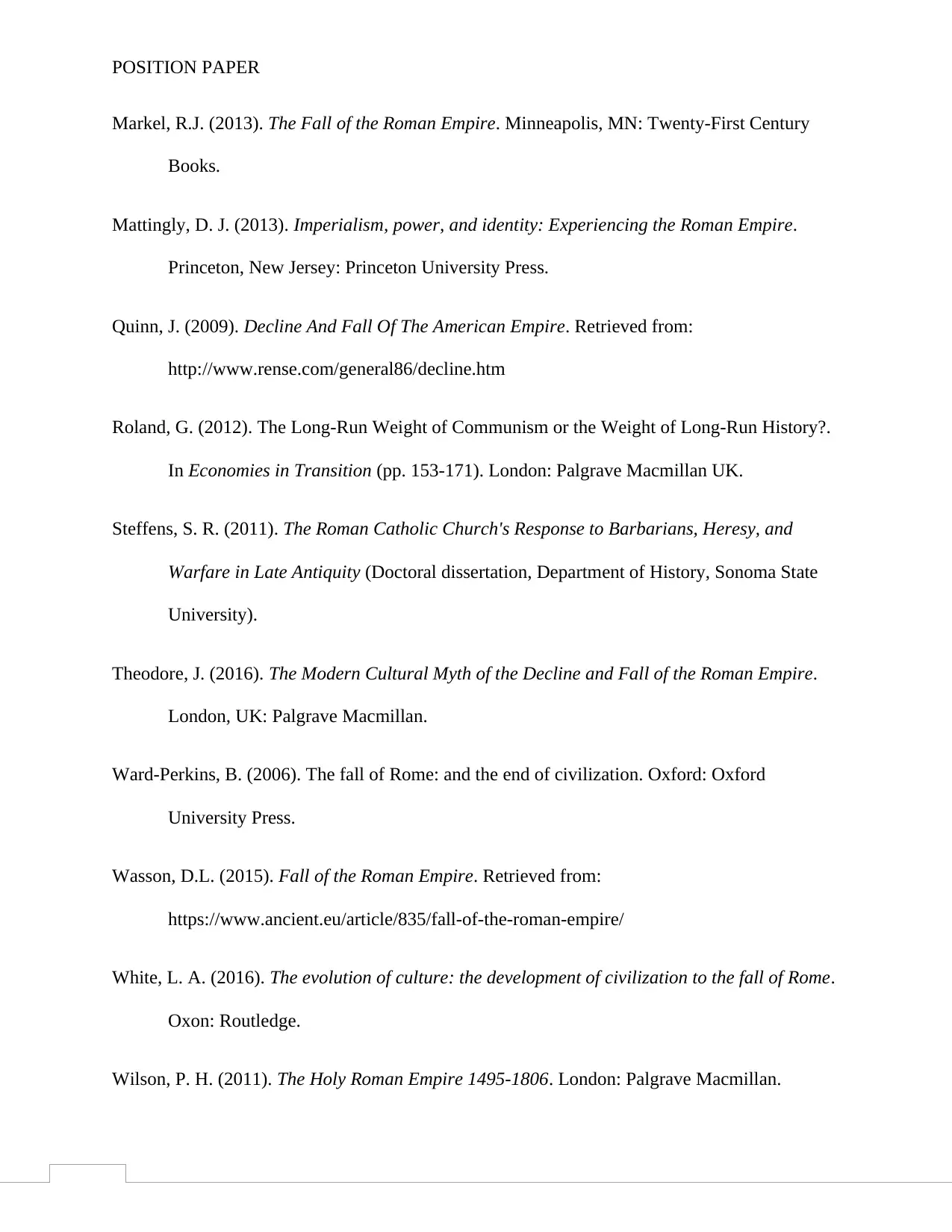
POSITION PAPER
Markel, R.J. (2013). The Fall of the Roman Empire. Minneapolis, MN: Twenty-First Century
Books.
Mattingly, D. J. (2013). Imperialism, power, and identity: Experiencing the Roman Empire.
Princeton, New Jersey: Princeton University Press.
Quinn, J. (2009). Decline And Fall Of The American Empire. Retrieved from:
http://www.rense.com/general86/decline.htm
Roland, G. (2012). The Long-Run Weight of Communism or the Weight of Long-Run History?.
In Economies in Transition (pp. 153-171). London: Palgrave Macmillan UK.
Steffens, S. R. (2011). The Roman Catholic Church's Response to Barbarians, Heresy, and
Warfare in Late Antiquity (Doctoral dissertation, Department of History, Sonoma State
University).
Theodore, J. (2016). The Modern Cultural Myth of the Decline and Fall of the Roman Empire.
London, UK: Palgrave Macmillan.
Ward-Perkins, B. (2006). The fall of Rome: and the end of civilization. Oxford: Oxford
University Press.
Wasson, D.L. (2015). Fall of the Roman Empire. Retrieved from:
https://www.ancient.eu/article/835/fall-of-the-roman-empire/
White, L. A. (2016). The evolution of culture: the development of civilization to the fall of Rome.
Oxon: Routledge.
Wilson, P. H. (2011). The Holy Roman Empire 1495-1806. London: Palgrave Macmillan.
Markel, R.J. (2013). The Fall of the Roman Empire. Minneapolis, MN: Twenty-First Century
Books.
Mattingly, D. J. (2013). Imperialism, power, and identity: Experiencing the Roman Empire.
Princeton, New Jersey: Princeton University Press.
Quinn, J. (2009). Decline And Fall Of The American Empire. Retrieved from:
http://www.rense.com/general86/decline.htm
Roland, G. (2012). The Long-Run Weight of Communism or the Weight of Long-Run History?.
In Economies in Transition (pp. 153-171). London: Palgrave Macmillan UK.
Steffens, S. R. (2011). The Roman Catholic Church's Response to Barbarians, Heresy, and
Warfare in Late Antiquity (Doctoral dissertation, Department of History, Sonoma State
University).
Theodore, J. (2016). The Modern Cultural Myth of the Decline and Fall of the Roman Empire.
London, UK: Palgrave Macmillan.
Ward-Perkins, B. (2006). The fall of Rome: and the end of civilization. Oxford: Oxford
University Press.
Wasson, D.L. (2015). Fall of the Roman Empire. Retrieved from:
https://www.ancient.eu/article/835/fall-of-the-roman-empire/
White, L. A. (2016). The evolution of culture: the development of civilization to the fall of Rome.
Oxon: Routledge.
Wilson, P. H. (2011). The Holy Roman Empire 1495-1806. London: Palgrave Macmillan.
1 out of 12
Related Documents
Your All-in-One AI-Powered Toolkit for Academic Success.
+13062052269
info@desklib.com
Available 24*7 on WhatsApp / Email
![[object Object]](/_next/static/media/star-bottom.7253800d.svg)
Unlock your academic potential
© 2024 | Zucol Services PVT LTD | All rights reserved.
